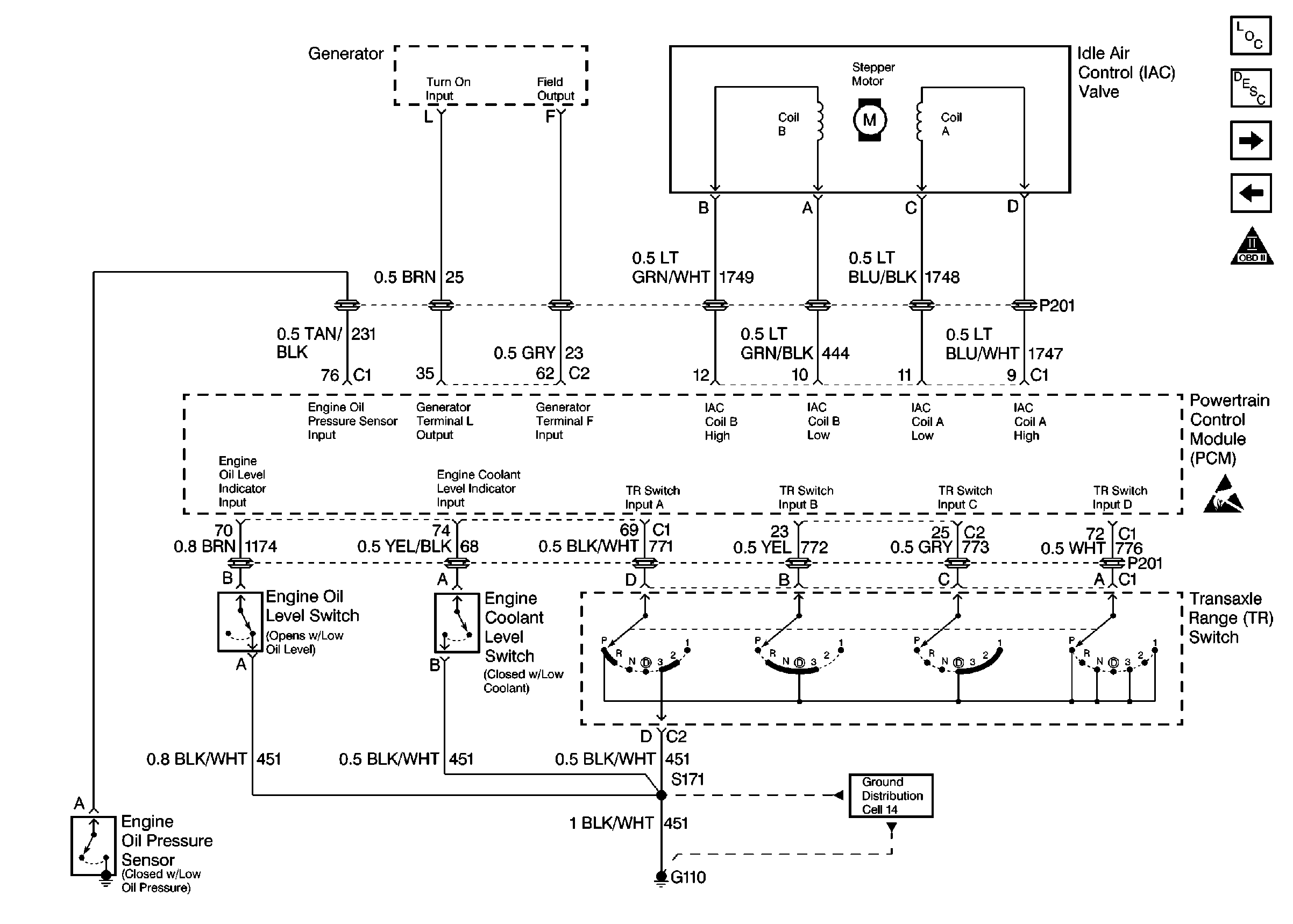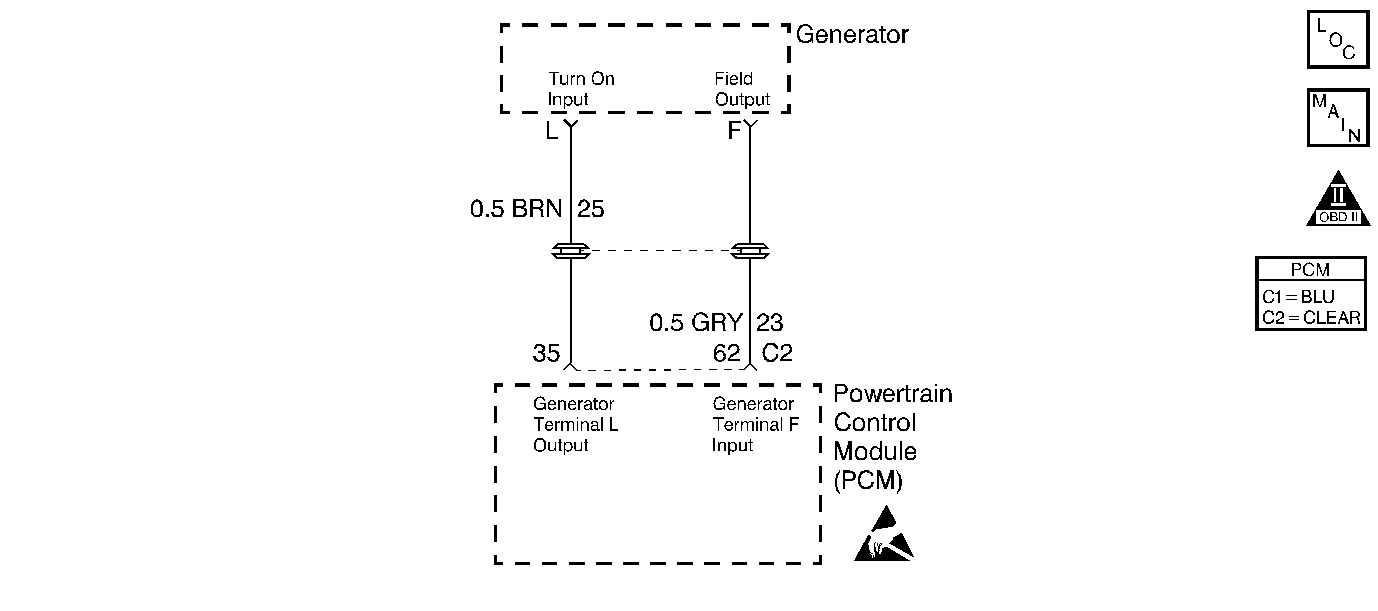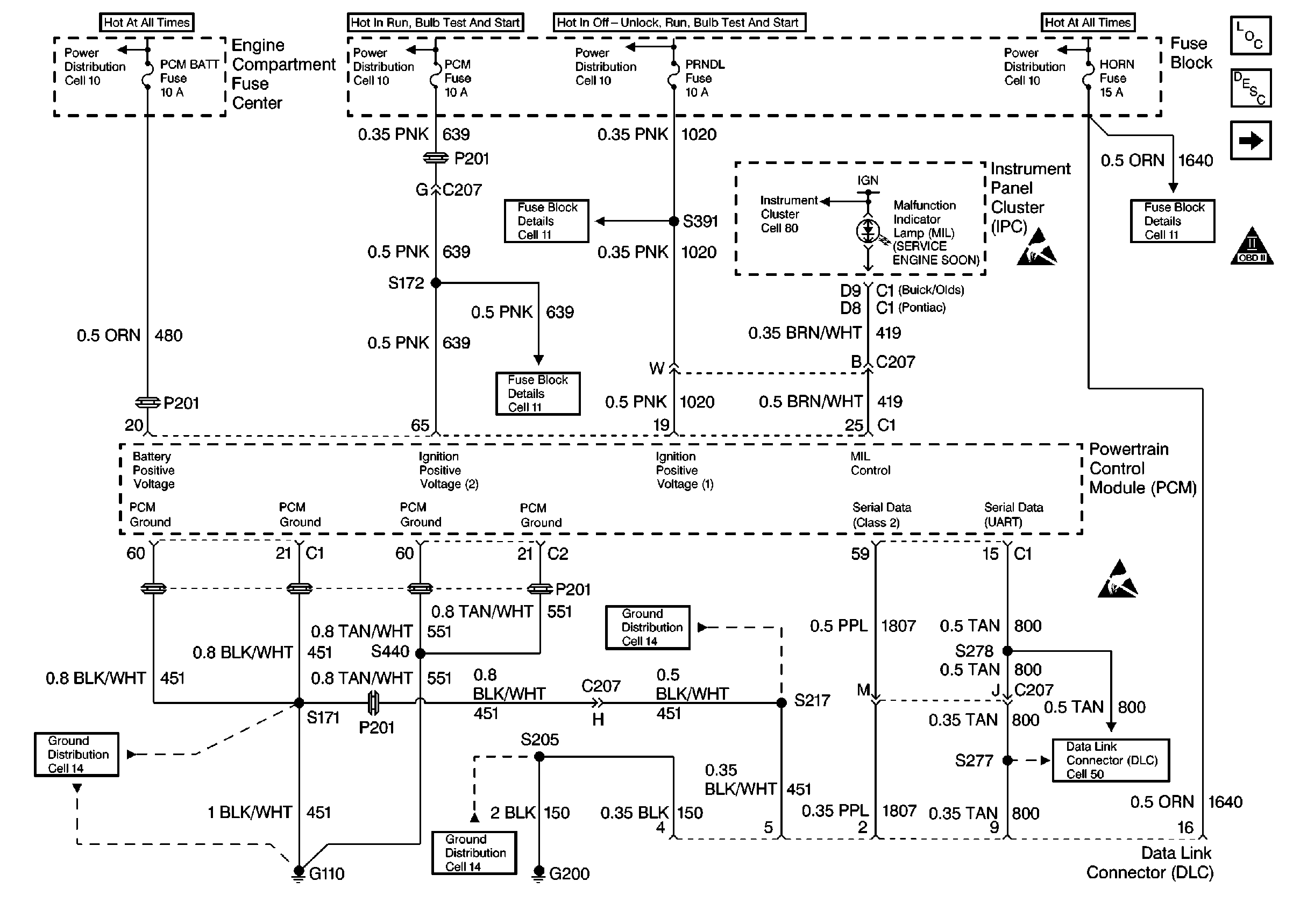Powertrain Control Module Controlled Warning Lamps Diagnosis Low Engine Oil Level Indicator
Refer to
IAC Valve, Generator, TR, Oil, and Coolant Switches

Circuit Description
The Engine Oil Level Indicator is a simple float switch that grounds the Engine Oil Level Indicator circuit when oil level is OK. The PCM checks the Engine Oil Level switch circuit at start-up. Before checking the state of the Engine Oil Level switch, the PCM performs a test routine based on time and engine coolant temperature to ensure that the engine oil has drained back into the sump. To test for low oil level at start-up, one of the following conditions must be present:
| • | If the engine coolant temperature was between 15°C (59°F ) and 90°C (194°F) at the last key OFF, the engine coolant temperature at key ON must be at least 12° C (22° F) cooler than the engine coolant temperature at the last key OFF. |
| • | If the engine coolant temperature was higher than 90°C (194°F) at the last key OFF, the time between last key OFF and the present key ON must be sufficient to allow the oil to drain back to the sump. The PCM will remain powered up for 10 seconds to ensure that the oil has drained back to the sump. If the key is turned back ON while the PCM is still powered up, the oil level will not be tested. |
The Low Oil Level Lamp will be illuminated for about a minute when the PCM checks for low oil level and the Engine Oil Level switch indicates that a low oil level condition exists (Engine Oil Level switch circuit not grounded). When the ignition is first turned On, the PCM commands the Low Oil Level lamp On for a brief period of time to test the bulb.
Diagnostic Aids
For diagnosis of the instrument panel, perform the System Check in the Instrument Panel Cluster section of Electrical Diagnosis.
Check for the following conditions:
| • | Poor connection at PCM or oil level sensor. Inspect harness connectors for backed out terminals, improper mating, broken locks, improperly formed or damaged terminals, and poor terminal to wire connection. |
| • | Damaged harness. Inspect the wiring harness for damage. If the harness appears to be OK, disconnect the PCM and turn the ignition on. Observe a voltmeter connected to the affected PCM circuit while moving connectors and wiring harnesses related to the PCM circuit. A change in voltage will indicate the location of the fault. |
Test Description
The numbers below refers to the step numbers on the Diagnostic Table.
-
Refer to IPC Microprocessor for further diagnostics. This diagnostic only covers inputs to the PCM.
-
This vehicle is equipped with a PCM which utilizes an Electrically Erasable Programmable Read Only Memory (EEPROM). When the PCM is being replaced, the new PCM must be programmed. Refer to Powertrain Control Module Replacement/Programming .
Step | Action | Value(s) | Yes | No |
|---|---|---|---|---|
1 |
Important: Ensure that engine oil level is not low (as indicated on dipstick) before continuing diagnosis. Was the Powertrain On-Board Diagnostic (OBD) System Check performed? | -- | ||
2 |
Is the test light on ? | -- | ||
3 |
Does the DVM display voltage near the specified value? | B+ | ||
4 | Connect the DVM between the Oil Level Switch signal circuit and chassis ground. Does the DVM display a voltage near the specified value? | B+ | ||
5 |
Was a problem found? | -- | Go to Diagnostic Aids | |
6 |
Was a problem found? | -- | ||
7 |
Was a problem found? | -- | ||
8 | Locate and repair open in the Oil Level Switch ground circuit. Refer to Repair Procedures in Electrical Diagnosis . Is action complete? | -- | -- | |
9 | Replace the Oil Level Switch. Is action complete? | -- | -- | |
Refer to Engine Electrical for Instrument Panel Cluster (IPC) Microprocessor for diagnosis Was A problem found? | -- | |||
Replace the PCM. Important: Replacement PCM must be programmed. Refer to Powertrain Control Module Replacement/Programming . Is action complete? | -- | -- | ||
12 | Check for proper operation of Indicator light(s). Refer to IPC Diagnosis . Is correct operation indicated? | -- | Repair Complete |
Powertrain Control Module Controlled Warning Lamps Diagnosis Generator Lamp Control Circuit

Diagnostic Aids
For diagnosis of the instrument panel, perform the System Check in the Instrument Panel Cluster section of Electrical Diagnosis.
Check for the following conditions:
| • | Poor connection at PCM or Generator. Inspect harness connectors for backed out terminals, improper mating, broken locks, improperly formed or damaged terminals, and poor terminal to wire connection. |
| • | Damaged harness. Inspect the wiring harness for damage. If the harness appears to be OK, disconnect the PCM and turn the ignition ON. Observe a voltmeter connected to the affected PCM circuit while moving connectors and wiring harnesses related to the PCM circuit. A change in voltage will indicate the location of the fault. |
Test Description
The number below refers to the step number on the Diagnostic Table.
-
This vehicle is equipped with a PCM which utilizes an Electrically Erasable Programmable Read Only Memory (EEPROM). When the PCM is being replaced, the new PCM must be programmed. Refer to Powertrain Control Module Replacement/Programming .
Step | Action | Value(s) | Yes | No |
|---|---|---|---|---|
1 | Was the Powertrain On-Board Diagnostic (OBD) System Check performed? | -- | ||
2 | If any DTCs are set repair DTCs first. Are any DTCs Set? | -- | ||
3 | Check the Generator input and output circuits between the Generator and the PCM for continuity. Do any of the circuits need repair? | -- | ||
4 | Repair as necessary, refer to Electrical Diagnosis for repair procedures . Is action complete? | -- | -- | |
5 | Refer to Instrument Panel and Console in section 8C to diagnose Instrument Panel Cluster warning lamps. Was a problem found? | -- | ||
6 | Refer to Electrical Diagnosis in section 6D3 to diagnose the charging system Was a problem found? | -- | ||
Replace the PCM. Important: The Replacement PCM Must be programmed. Refer to Powertrain Control Module Replacement/Programming . Is action complete? | -- | -- | ||
8 | Check for proper operation of Indicator light(s). Refer to IPC diagnosis in section 8C1 . Is correct operation indicated? | -- | Repair complete |
Powertrain Control Module Controlled Warning Lamps Diagnosis Low Coolant Level Indicator
Refer to
IAC Valve, Generator, TR, Oil, and Coolant Switches

Diagnostic Aids
For diagnosis of the instrument panel, perform the System Check in the Instrument Panel Cluster section of Electrical Diagnosis.
Check for the following conditions:
| • | Poor connection at PCM or Coolant Level Indicator. Inspect harness connectors for backed out terminals, improper mating, broken locks, improperly formed or damaged terminals, and poor terminal to wire connection. |
| • | Damaged harness. Inspect the wiring harness for damage. If the harness appears to be OK, disconnect the PCM and turn the ignition ON. Observe a voltmeter connected to the affected PCM circuit while moving connectors and wiring harnesses related to the PCM circuit. A change in voltage will indicate the location of the fault. |
Test Description
The numbers below refer to the step numbers on the Diagnostic Table.
-
Refer to IPC Microprocessor for further diagnostics. This diagnostic only covers inputs to the PCM.
-
This vehicle is equipped with a PCM which utilizes an Electrically Erasable Programmable Read Only Memory (EEPROM). When the PCM is being replaced, the new PCM must be programmed. Refer to Powertrain Control Module Replacement/Programming .
Step | Action | Value(s) | Yes | No |
|---|---|---|---|---|
1 |
Important: Ensure that Engine Coolant Level is not low, refer to Engine Cooling System before continuing diagnosis. Was the Powertrain On-Board Diagnostic (OBD) System Check performed? | -- | ||
2 |
Is the test light on ? | -- | ||
3 |
Does the DVM display voltage near the specified value? | B+ | ||
4 | Connect the DVM between the Engine Coolant Level Indicator signal circuit and chassis ground. Does the DVM display a voltage near the specified value? | B+ | ||
5 |
Was a problem found? | -- | ||
6 |
Was a problem found? | -- | ||
7 |
Was a problem found? | -- | ||
8 | Locate and repair open in the Engine Coolant Level Indicator ground circuit refer to Repair Procedures in Electrical Diagnosis . Is action complete? | -- | -- | |
9 | Replace the Engine Coolant Level Indicator. Is action complete? | -- | -- | |
Refer to Intrument Panel Cluster (IPC) Microprocessor for diagnosis Was a problem found? | -- | |||
Replace the PCM. Important: Replacement PCM must be programmed. Refer to Powertrain Control Module Replacement/Programming . Is action complete? | -- | -- | ||
12 | Check for proper operation of Indicator light(s). Refer to IPC Diagnosis. Is correct operation indicated? | -- | Repair Complete |
Powertrain Control Module Controlled Warning Lamps Diagnosis Tach Diagnosis
Refer to
Power, Ground, MIL, and DLC

Diagnostic Aids
For diagnosis of the instrument panel, perform the System Check in the Instrument Panel Cluster (IPC) Microprocessor.
Check for the following conditions:
| • | Poor connection at PCM. Inspect harness connectors for backed out terminals, improper mating, broken locks, improperly formed or damaged terminals, and poor terminal to wire connection. |
| • | Damaged harness. Inspect the wiring harness for damage. |
Test Description
The number below refers to the step number on the Diagnostic Table.
-
This vehicle is equipped with a PCM which utilizes an Electrically Erasable Programmable Read Only Memory (EEPROM). When the PCM is replaced, the new PCM must be programmed. Refer to Powertrain Control Module Replacement/Programming .
Step | Action | Value(s) | Yes | No |
|---|---|---|---|---|
1 | Was the Powertrain On-Board Diagnostic (OBD) System Check performed? | -- | ||
2 | Are any DTCs set? | -- | ||
3 | Install scan tool, monitor engine RPM. Does scan tool engine RPM indicate approximate engine operation? | -- | ||
4 | Monitor the Tachometer output on the Instrument Panel Cluster with engine RPM on scan tool. Do they closely match each other? | -- | ||
5 | Refer to Electrical Diagnosis for diagnosing Serial Data circuit. Was a problem found? | -- | ||
6 | Refer to Instrument Panel Cluster in section 8C1 to diagnose the Tachometer. Was a problem found? | -- | ||
7 | Install scan tool to known good vehicle and monitor engine RPM. Does engine RPM on scan tool indicate approximate engine operation? | -- | Check scan tool for proper operation | |
Replace the PCM. Important: Replacement PCM must be programmed. Refer to Powertrain Control Module Replacement/Programming .Is action complete? | -- | -- | ||
9 | Check for proper operation of the Tachometer. Refer to IPC Diagnosis in section 8C1 . Is correct operation indicated? | -- | Repair complete |
